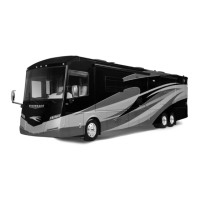
Do you have a question about the Winnebago Destination and is the answer not in the manual?
| Brand | Winnebago |
|---|---|
| Model | Destination |
| Category | Motorhomes |
| Language | English |
Details on the operator's manual, its scope, and contents.
Explanation of warning terms (Danger, Warning, Caution) used in the manual.
Covers dealer's pre-delivery checks and recommended front axle alignment.
Information on obtaining service and reporting safety defects to NHTSA.
Details the vehicle's label for occupant and cargo limits.
Explanation of the data points on the vehicle certification label.
Technical specifications and fluid capacities for different motor home models.
Section for recording owner, vehicle, and dealer/service center contacts.
Overview of warranty coverage, exclusions, and owner responsibilities.
Procedure for warranty repairs and mention of state-specific clauses.
Seat belts, seat positions, escape windows, and safe driving practices.
DANGER warning for refueling and general safety with fuel and propane.
Steps to take if propane gas leaks are detected, including detector function.
CO warnings, exhaust system maintenance, and CO alarm operation.
Smoke alarm operation and fire extinguisher inspection/replacement.
Safe handling of electrical components, grounding, and circuit protection.
Tips for safe vehicle loading and basic maintenance advice.
Information on using emergency exits, including the escape window.
Health effects of formaldehyde exposure and ventilation recommendations.
Explains mold formation, its causes, and prevention methods.
Tips to prevent mold growth and Winnebago's response to mold issues.
Guidance for roadside emergencies and procedures for changing a flat tire.
Advice on recovery towing and jump-starting the vehicle's engine.
What to do if the engine overheats and associated safety warnings.
Instructions for adjusting and swiveling driver and co-pilot seats.
Warning about adjusting driver's seat while moving and seat locking.
How to face seats rearward and adjust armrests for comfort and access.
Instructions for extending and retracting the passenger footrest if equipped.
Proper use, fastening, and release of lap and lap/shoulder belts.
Warnings about snug belt fit and occupying seats while moving.
Guidelines for maintaining seat belts, including cleaning and replacement.
Information on installing child restraints and using tether anchor loops.
Operation of the KeyOne system and power door lock switches.
Using the keyless entry system and reprogramming the remote.
Adjusting power mirrors, including mirror heaters and head adjustment.
Description of the rearview camera monitor system for maneuvering.
Operation of optional sideview cameras and powered sunvisors.
How to use the auto-apply and manual parking brake systems on Workhorse chassis.
Operation of Freightliner parking brake and the Grade Brake feature.
How the Freightliner exhaust brake works and its activation switch.
Using the overdrive switch to deactivate automatic overdrive for the transmission.
Operation of hazard flashers and turn signals/headlight controls.
How to operate the map light switch.
How to adjust the tilt and telescope of the steering column.
Using the battery boost switch for emergency starting.
Operation of the automotive dash climate control panel.
Operation of defrost fans and the in-dash radio system.
Information on Sirius satellite radio and connecting an iPod.
Using the radio power switch and selecting speakers for dash radio.
Using the Sirius Plug and Play satellite radio system.
CB radio wiring and operation of the air horn system.
Fuel selection for diesel engines and winter fuel waxing/anti-gel additives.
Procedures for filling the diesel tank and starting/stopping the engine.
Precautions for idling diesel engines and using the engine block heater.
Location and operation of the engine heater switch and front service access.
Accessing engine service points via the rear exterior grille.
Removing engine top access covers for inspection or part replacement.
How to prop the bed board and information on the diesel fuel/water separator.
Coolant system checks and operation of the chassis battery disconnect switch.
Using the chassis battery disconnect and understanding automotive circuit breakers.
Location of fuse diagrams and operation of windshield wipers and washers.
Importance of tire pressure and suspension alignment for vehicle handling.
Checking exterior lights and techniques for driving in mountainous terrain.
How to operate the refrigerator and ensure proper leveling for function.
Selecting refrigerator modes and operation of the ice maker system.
Accessing the refrigerator for service and operation of the range top.
How to light range burners and warnings about asphyxiation from cooking.
Operation and features of the microwave oven and range hood.
Central panel for monitoring water, propane, and battery levels.
Selecting gray tank display and checking propane tank level.
Checking battery charge and operating the water pump switch.
Information on solar charger panel and EMS for load distribution.
Using the EMS display and operating the washer/dryer.
Operating the dual-power water heater for gas, electric, or quick recovery.
Information on the P-T relief valve and the Motoraid water heating system.
How to start up, operate, and shut down the propane gas furnace.
Operation of the central heat/air conditioning thermostat and changing temperature setpoints.
Chart detailing system functions based on thermostat and fan switch positions.
Information on the central air conditioner location and airflow.
Importance and procedure for inspecting and replacing the air conditioner filter.
Overview of the propane system, how it works, and tank features.
Procedure for refilling the permanently mounted propane tank at a dealership.
Recommendations for propane fuel type and issues with air in the tank.
General safety precautions for using the propane gas system.
Warnings about propane use and steps to take if a gas leak is suspected.
Information on the pressure regulator, its function, and maintenance.
Causes and solutions for regulator freeze-up and propane vaporization in cold weather.
Description of the 12V and 120V systems and general electrical safety precautions.
How the 120V AC system works and connecting the external power cord.
Step-by-step guide for connecting the coach to an external power source.
Understanding park protection, the power converter, and charging section.
How 120V AC circuit breakers protect components and how to reset them.
Information on 120V AC outlets and the function of GFCI outlets.
Basic operation, starting/stopping, and safety warnings for the generator.
Generator exhaust safety and the house 12-volt DC system components.
Information on house batteries and the 12-volt breaker panel.
Using the AUX BATT switch to disconnect house batteries for storage.
Location of batteries and guidelines for battery care to prevent sulfating.
Detailed maintenance practices for battery terminals, fluid levels, and charging.
Overview of the fresh water system and how to fill the fresh water tank.
Connecting to city water and procedures for disconnecting from the supply.
Proper use of the fresh water valve and the need for pressure regulators.
Location of utility light and how to operate the water pump system.
Instructions for cleaning the water pump strainer to prevent damage.
Steps for priming the water system for initial use.
Information on the filtration system and how to replace the filter cartridge.
Procedure for disinfecting the potable water system using chlorine bleach.
Methods for continuous tank sanitation and understanding the shower hose vacuum breaker.
Using the exterior wash station and operating the RV toilet.
Important usage restrictions for the RV toilet and an overview of the waste water system.
Step-by-step guide for dumping the black and gray water holding tanks.
Procedures for dumping tanks and connecting to on-site sewage hook-ups.
Checking tank levels and locating waterline and tank drain valves.
Operating the water heater bypass valve for winterization.
Methods for winterizing the water system and draining the water heater.
Detailed steps for winterizing waterlines using compressed air.
Completing the blow-out procedure, including disconnecting air pressure and adding antifreeze.
Steps for winterizing lines by filling with non-toxic RV antifreeze.
Adjusting winterization valves and filling lines with antifreeze.
Completing antifreeze fill and draining the water heater tank.
Draining optional appliances and closing all drain valves after winterizing.
Chart detailing the locations of various water system drain valves.
How to switch between antenna, cable TV, and satellite TV signals for different TVs.
Using the HD video system to watch multiple sources on multiple TVs simultaneously.
Connecting to cable TV and basic operation of the audio-video system.
Connecting and setting up the DVD home theater system for optimal playback.
How to play DVDs and route TV sound through home theater speakers.
Connecting dash radio to theater speakers and bedroom entertainment system.
Instructions for playing DVDs and operating flip-down screen video players.
Operating video player power and playing CD audio/video discs.
Connecting A/V components and operating reading lights.
Information on the exterior entertainment center TV and its connections.
Playing DVDs and selecting video sources via the selection box.
Routing TV audio through the coach's stereo speakers for enhanced sound.
Using the electrical inverter to convert DC to AC power when shore power is unavailable.
Understanding inverter controls and raising/rotating the TV antenna.
Operating the TV signal amplifier and connecting cable TV/satellite.
Information on pre-wiring for digital satellite TV systems.
Using the automatic digital satellite TV system for program reception.
Operating the automatic satellite dish and using the exterior entertainment center.
Securing lounge chairs and setting up dinette tables and chairs.
How to extend the dining table and adjust the pedestal table.
Instructions for converting the dinette into a bed.
Detailed steps for converting the dinette into a bed and back to dinette seating.
Converting the sofa to a bed and operating the Rest Easy multi-position lounge.
Operating the lounge recline and converting it to a bed.
Using the power lift mechanism to adjust the bed head.
Operating the power lift switch and securing folding bunk beds.
Adjusting tension and preserving the shape of pleated window blinds.
Natural wood characteristics and care of cabinetry.
Operating electric travel locks to secure slideout rooms during transit.
Using the keylock to provide power to slideout control switches.
How to extend and retract electric slideout rooms safely.
Procedures for retracting slideout rooms and precautions for extreme weather.
Troubleshooting electric slideout issues related to battery voltage or circuit breakers.
Using manual mode and crank handles for slideout room operation.
Manually cranking slideout rooms in case of motor or electrical failure.
Tips for maintaining slideout seals and mechanisms for smooth operation.
Using the hydraulic leveling system and its remote switches for parking site setup.
Understanding the 'Jacks Down' indicator and emergency leveling system retraction.
Accessing the hydraulic pump and steps for accidental jack extension.
Procedure for checking the hydraulic oil level in the leveling system.
Checking the hydraulic oil level using the dipstick and recommended fluid types.
Importance of sealant inspection and maintenance for water ingress prevention.
Safety warnings for roof access and advice on roof sealant and damage repair.
Importance of cleaning the undercarriage to prevent rust and corrosion.
Precautions for parking and driving to maintain the exterior paint finish.
Recommended washing techniques and methods for removing bug residue.
Guidelines for polishing, waxing, and inspecting the exterior for damage.
Inspecting fiberglass for cracks and caring for exterior appliques and decals.
Guidelines for front end masks and cleaning plastic exterior parts.
Checking exterior lights and recommended cleaning for interior fabrics.
Cleaning Ultraleather upholstery and vinyl surfaces.
Cleaning wooden and vinyl simulated wood cabinetry.
Natural wood characteristics and care instructions for the stainless steel galley sink.
Cleaning instructions for the toilet, tub, shower walls, and lavatory sink.
Cleaning windows and lubricating door locks and hinges.
Steps for preparing the motor home for storage, including cleaning and battery care.
Procedures for removing the coach from storage and starting the ice maker.
Consulting the chassis manual for service, maintenance, and fuses.
Location of chassis fuses and fuses for the towing package.
Location of chassis fuses and relays for Workhorse chassis.
Location of chassis diagnostic connectors for troubleshooting.
Maintenance schedule for propane gas system components.
Maintenance schedule for battery, fuses, breakers, and GFCI receptacles.
Maintenance for the generator and plumbing systems, including winterizing.
Maintenance schedule for slide-out and leveling systems, including oil checks.
Schedule for cleaning the exterior, roof, sidewalls, windows, and underside.
Regular checks for operation of headlights, turn signals, horn, and safety alarms.
Maintenance schedule for water heater, refrigerator, furnace, AC, and range top.
Schedule for inspecting and replacing sealants on the coach.
Following chassis maintenance guides and inspecting the hitch receiver.
Checking tire pressure/wear and lubricating locks/hinges.
Diagram and part numbers for recommended sealant applications on the coach exterior.
Guidelines for loading cargo, distributing weight, and understanding weight ratings.
How to weigh the loaded coach and find public access scales.
Step-by-step guide for weighing the vehicle, including corner weighing.
Understanding weight ratings and the impact of hitch load on handling.
Towing capacity, tongue weight, and general towing advice.
Proper trailer wiring connection and towing weight ratings (GVWR, GAWR).
Understanding GCWR, hitch classifications, and vertical tongue load.
How to operate the electric entry step, including automatic modes and warnings.
Using the entry step in automatic mode and with the door sensor.
Operating the entry step in stationary mode and using the stepwell cover.
Using the emergency retract for the step cover and safety for roof ladder use.
Ladder safety precautions and basic operation of the power awning controls.
Understanding awning power, auto-retract, and door awning switch.
Properly closing storage doors and operating crank-out windows.
Operating slider windows and the power roof ventilator.
Operating the ceiling ventilator and using the air hose connector.
Managing humidity and condensation during extended occupancy of the coach.
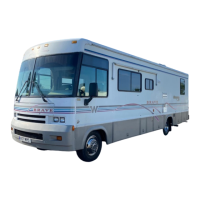
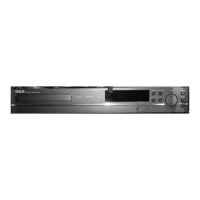
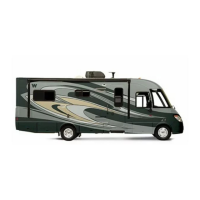
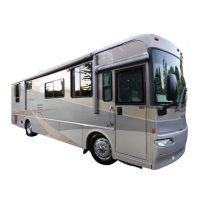








